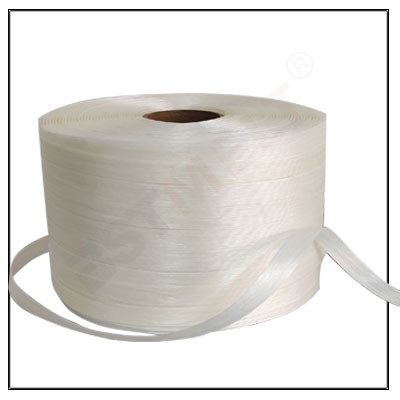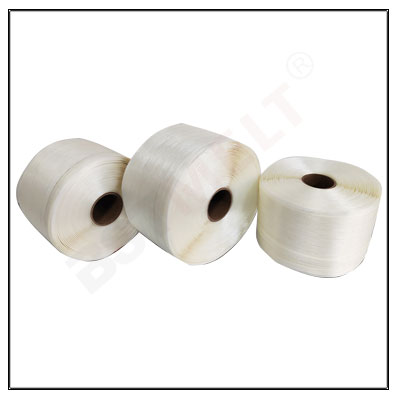Bale Press Strapping: High-Quality Polyester Textile Strapping for Baling Presses
In the waste management and recycling industries, efficiency and reliability are crucial when handling large volumes of recyclable materials. One essential component of this process is the strapping used to secure compressed bales of waste, such as cardboard, plastic, and paper. **Bale Press Strapping**, a high-quality polyester textile hot melt strapping, is specifically designed for use in baling presses, offering a durable, efficient, and cost-effective solution for businesses looking to improve their waste handling and transportation processes.


### What is Bale Press Strapping?
Bale Press Strapping is made from high-tensile polyester fibers that are bonded together using a hot melt process. This process ensures that the strapping has excellent strength and durability, making it ideal for securing heavy, compressed bales in recycling facilities, waste management plants, and other industries that generate large quantities of recyclable materials. The polyester fibers are highly resistant to tension, providing the strength needed to hold tightly compressed bales together during handling, storage, and transport.
This type of strapping is compatible with most baling machines and presses, making it a versatile choice for businesses looking to optimize their bale strapping operations.
### Key Benefits of Bale Press Strapping
1. **High Strength and Durability**
One of the primary advantages of Bale Press Strapping is its high tensile strength. The hot melt bonding process creates a robust, durable strapping material that can withstand the immense pressure exerted by tightly compressed bales. This ensures that the bales remain securely strapped, preventing any material from becoming loose or unbundled during handling and transportation. Additionally, the strapping is resistant to moisture, UV rays, and environmental conditions, making it suitable for both indoor and outdoor storage.
2. **Lightweight and Easy to Use**
Unlike steel strapping, which can be heavy and difficult to handle, Bale Press Strapping is lightweight and easy to work with. This makes it an excellent choice for businesses that prioritize both worker safety and operational efficiency. The lightweight nature of the strapping reduces the physical strain on workers, allowing for faster and more efficient strapping processes. It also helps to lower overall transportation costs due to its reduced weight compared to traditional steel or wire strapping.
3. **Improved Safety**
Safety is a critical consideration in any industrial operation, and Bale Press Strapping offers significant advantages in this regard. Steel straps, commonly used for securing heavy bales, can have sharp edges that pose a risk of injury to workers during application and removal. In contrast, polyester textile strapping is soft and flexible, reducing the risk of cuts and injuries. Additionally, Bale Press Strapping does not rust or corrode, which can happen with steel strapping and potentially damage the products being secured.
4. **Shock Absorption and Flexibility**
Bale Press Strapping has excellent shock absorption properties, allowing it to maintain tension even when the bales shift or are subjected to external impacts during transportation. Its flexibility means that it can conform to the shape and size of compressed bales, ensuring a tight and secure bond without damaging the materials being bundled. This is especially important for industries that transport bales over long distances, where movement and shifting can occur.
5. **Cost-Effective Solution**
Using Bale Press Strapping can lead to significant cost savings for businesses. Its durability ensures that fewer straps are needed to secure bales effectively, and its lightweight nature lowers shipping costs. Additionally, because it is compatible with most baling machines, companies can easily integrate it into their existing operations without needing to invest in new equipment. The strapping’s reusability in some cases also helps reduce costs in the long term.
6. **Environmentally Friendly**
As sustainability becomes a top priority for businesses, many are looking for eco-friendly alternatives to traditional packaging materials. Bale Press Strapping is often made from recyclable polyester fibers, making it a more environmentally friendly option compared to steel or other non-recyclable materials. This not only helps businesses reduce their environmental footprint but also aligns with growing global efforts to promote sustainable waste management practices.
### Applications of Bale Press Strapping
Bale Press Strapping is specifically designed for use in baling presses, making it ideal for businesses involved in waste management, recycling, and material handling. It is commonly used to secure compressed bales of materials such as:
- **Cardboard**: Ensuring that large volumes of flattened cardboard remain tightly packed for transportation to recycling facilities.
- **Plastic**: Securing bales of plastic bottles, containers, and packaging materials for efficient storage and transport.
- **Paper**: Compressing and strapping paper waste, such as newspapers and office paper, for recycling purposes.
- **Textiles**: Managing the bundling and transport of used textiles in recycling operations.
Bale Press Strapping is versatile enough to be used in both manual and automatic baling operations, making it suitable for businesses of all sizes.

### Conclusion
**Bale Press Strapping** is a high-quality, high-tensile polyester textile strapping solution designed to meet the needs of businesses that rely on baling presses to manage large volumes of recyclable materials. Its strength, durability, and ease of use make it an excellent choice for industries ranging from recycling and waste management to manufacturing and logistics.
With its cost-effective and environmentally friendly properties, Bale Press Strapping not only ensures that bales are securely bundled but also supports businesses in their efforts to improve operational efficiency and sustainability. By switching to Bale Press Strapping, companies can benefit from a safer, more reliable, and cost-efficient method of securing their compressed materials for transport and storage.
HomeNewsProductsSolutionDisclaimersPrivacyCooperationContact Us
Copyright © 2023 BSTSTRAP